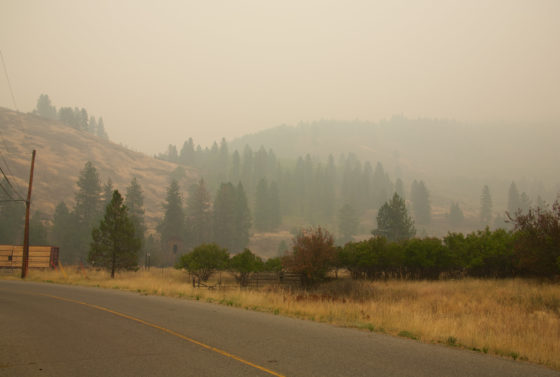Smoke from B.C. wildfires is causing terrible air quality in some regions. How can outdoor workers and volunteers protect themselves from forest fire smoke?

Photo credit: iStock.com/Ivan_Sabo
This question is on the minds of many in B.C. as forest fire season continues with a vengeance.
Employers can find answers in WorkSafeBC’s Wildfire smoke: Frequently asked questions. (Please note that it doesn’t apply to firefighters.)
It states that, in general, long-term health risks from short-term exposure to low or moderate levels of smoke during wildfires are quite low.
“The potential for adverse health effects from wildfire smoke depends on the level and duration of exposure, age of the workers, individual susceptibility, and other factors. For these reasons, not everyone exposed to smoke will be affected in the same way.”
People with pre-existing conditions like asthma or allergies may have aggravated symptoms. Others may feel irritation of the eyes, nose, and throat, but these symptoms are generally temporary.
Please read the FAQs for full details. Depending on the situation, different strategies may be called for, including:
- Looking for ways to reduce workers’ level of physical activity when possible
- Considering the direction of the smoke and following air quality advisories for the area to schedule the work accordingly
- Relocating work to less smoky areas or rescheduling it for when the air quality improves
The FAQs also remind employers to remember the hazards associated with heat stress, which I wrote about in my post Working in the hot sun. Working in the heat may at first just feel uncomfortable, but it can lead to serious health complications and even death in extreme cases. Ensure that workers stay hydrated by drinking lots of water.
Evacuating workers when a forest fire is near
Sometimes, when the fire gets close enough, work crews need to evacuate.
In my post Evacuating workers when there’s a forest fire nearby, I shared a story from someone who used to work as a treeplanter.
“When you work in the forest – whether for forestry or oil and gas – it’s not uncommon to be working amid forest fires. Employers really need to consider ahead of time ‘When is it time to instigate an evacuation?’ and ‘How would we do it?’ It’s not always straightforward.”
Call the Prevention Information Line
You can call WorkSafeBC’s Prevention Information Line at 1.888.621.7233 (1.888.621.SAFE) if you have any questions about safety at your workplace.



Do you have a FAQ that does apply to fire fighters?
Thank you for asking, Steve. I will get back to you on this ASAP.
Highlighted the effect of forest smoke on outdoor workers.